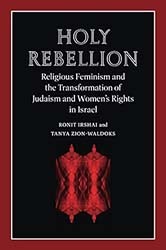Israeli Feminist Scholarship provides an excellent and wide-ranging introduction to major aspects of feminism and intersectionality from the perspectives of fifteen authors who have analyzed a number of sectors in Israeli society. Fuchs’s selections for this anthology cover the topics one usually finds in analyses about women’s experiences— for example, women’s experiences in the workplace and in the home, and also the challenges faced by women of color and lesbians in participating in feminist dialogue and advocacy— but with insights that are likely unfamiliar to those living outside of Israel. Uniquely Israeli, this book covers the historic and current (in)equalities in Israeli society as experienced by women in the early history of the State of Israel, in the Israeli military, on the kibbutz, as Holocaust survivors, and as a result of the Israeli-Palestinian conflict. Of particular interest are the chapters about the experiences of Mizrahi women in Israel, which provide insight about race and class that will be at once different and familiar to those readers acquainted with the field of women’s and gender studies around the world.
Fuchs has curated the selection well. The book progresses naturally, offering a strong foundation in feminist theory and then moving from familiar issues to the more complicated discourse of intersectionality. Many of the book chapters and articles making up this anthology were written in the 1990s and early 2000s; only a handful were written in the last ten years. That said, the articles remain important contributions to the field, and readers will benefit from establishing awareness and knowledge of the key points in Israeli feminist scholarship before seeking out the latest research.
This book is appropriate for anyone interested in academic approaches to feminism and intersectionality from Israeli perspectives. The chapters presume some knowledge of feminist theory and the history of the development of feminism, gender studies, and feminist advocacy, but it is not necessary to have previous understanding of these topics in order to learn from the analyses presented in the book. Overall, this is a reliable yet inspiring resource, one that will be useful for the next generation of feminist scholars. Acknowledgments, contributors, index, preface.
Related Content:




